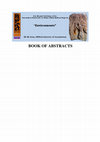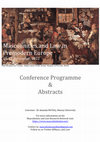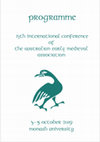Journal Articles by Julian Calcagno

Journal of the Australian Early Medieval Association, 2021
The values that underpin the Anglo-Saxon concept of honour changed at the beginning of the sixth ... more The values that underpin the Anglo-Saxon concept of honour changed at the beginning of the sixth century. During this period, Anglo-Saxon kingdoms enshrined a new era of cultural and religious fervour, inculcating new practices of honour among the new Christianised Anglo-Saxon elite. This paper demonstrates the transition from pagan to Christian honour systems. Historians have often examined honour through concepts based on comparisons or 'terms of art', for example 'Bushido' in Japan, 'Futuwwa' in Islam, and 'chivalry' in Christianised later-medieval Europe. This paper emulates these examples by examining honour in Anglo-Saxon society through use of the Old English term weorð, an under-studied phenomenon. Unlike Bushido or chivalry, weorð does not imply a mandated way of living. Weoro is instead pervasive, encompassing many modes of Anglo-Saxon life: poetry, giving- and -receiving, burial, kin, and bestowing honours. This paper combines sociological analysis with historical evidence.
Conference Presentations by Julian Calcagno

International Medieval Conference, Leeds, 2023
I am delighted to present to you the programme for the International Medieval Congress 2023. This... more I am delighted to present to you the programme for the International Medieval Congress 2023. This summer's Congress will welcome over 2,300 actively-involved participants, with its academic programme featuring 714 sessions, keynotes, and round table discussions. After last year's first hybrid event, we are looking forward to continue to build on the experience and, once again, have all sessions, keynotes, and round table discussions accessible both in person and virtually-for those of us who are unable to travel. The pandemic has certainly changed our lives and the ways we engage and network with each other. While we are only starting to work out new ways of working and exchanging academic ideas through new formats, we hope to provide an excellent offer for both in-person and virtual attendance. A huge part of IMC 2023 is its Special Thematic Strand on 'Networks & Entanglements'. It has clearly attracted a lot of interest from medievalists of all disciplines, showing that networks and entanglements are omnipresent in almost all areas of Medieval Studies. We have 420 sessions and round table discussions relating to the special thematic strand, subdivided into 38 sub-strands. Our thanks go to Johannes Preiser-Kapeller (Institut für Mittelalterforschung, Österreichische Akademie der Wissenschaften, Wien) who expertly and patiently managed to review all proposals and structure them into such a coherent and comprehensive set of sessions.

ISSEME Conference Manchester, 2023
Following the introduction of trial by combat, the Normans inadvertently reshaped the phenomenon ... more Following the introduction of trial by combat, the Normans inadvertently reshaped the phenomenon of honour which was central to lay feuding ethics in medieval England. By the twelfth century, the rights of freemen could no longer be protected by oath if they were found culpable of a heinous crime. Instead, their actions were subject to the laws of their Norman counterparts. As such, trial by combat appears to have been an alternative medium to satisfy any perceived loss of honour. There is no clear indication to demonstrate whether the Normans placed a higher value on honour than their Anglo-Saxon subordinates. However, the need to satisfy honour through combative violence, rather than compensation or alternative modes of feuding violence, appears to have been a significantly important aspect for the Norman elite as exemplified in the early corpus of Anglo-Norman law. The proposed paper will examine
conceptualisations of honour, and situations in which the phenomenon of honour is present in both Anglo-Saxon and Anglo-Norman law, whilst drawing attention to aspects of continuity and change.

Masculinities and Law in Premodern Europe Conference, 2022
The phenomenon of honour was central to lay masculine feuding ethics in Anglo-Norman England. By ... more The phenomenon of honour was central to lay masculine feuding ethics in Anglo-Norman England. By the twelfth century, new legal approaches to disruptive masculinities, such as violence, were reshaped by the Norman elite in Anglo-Saxon England. Trial by combat had become the new medium to satisfy the loss of honour if affronted. As such, vengeance was often a potent emotion necessary to satisfy the loss of honour. The Normans characterised dispute settlements either through monetary compensation or through violent feuding practices. This was authorised in early Anglo-Norman law codes such as the Willelmes cyninges asetnysse and the Leges Henrici Primi. Is there a possibility then, that Norman feuding ethics were drawn from a distinctly more vengeful desire to restore honour than their Anglo-Saxon subordinates? Or rather, was this the beginning of the development of a chivalric honour code in England? The proposed paper will examine conceptualisations and contexts that are indicative of lay masculine honour in early Anglo-Norman legal documents. Moreover, it contextualises settlement disputes in gendered spaces of law.

International Medieval Conference, Leeds University, 2022
Despite being one of the most significant rulers in Anglo-Saxon England, Offa’s reputation (757-7... more Despite being one of the most significant rulers in Anglo-Saxon England, Offa’s reputation (757-796CE) remains controversial. No contemporary biography of Offa survives and many of the sources denoting his reign, such as the Anglo-Saxon Chronicle, tend to be of West-Saxon origin and remain suspect to biases. Thus, with the emergence of a new Anglo-Norman intellectual culture in post-Conquest England new considerations were taken into account concerning the Mercian king’s reputation. In the Anglo-Saxon chronicle, Offa’s reception was treated as ‘damnatio memoriae’ whereas in the chronicle of Æthelweard he was commended as ‘vir mirabilis’. Post-Conquest chroniclers such as William of Malmesbury, John of Worcester, Henry of Huntingdon, and Matthew of Paris often transmit previous depictions of Offa in a similar light whilst expanding on the works of the Anglo-Saxon chroniclers such as Æthelweard and the anonymous authors of the Anglo-Saxon Chronicle. In addition to this, however, there are many instances in the Anglo-Norman chronicles which cast the reputation of Offa in a very different light. This paper evaluates transmissions and adaptions in pre- to post-Conquest sources which encapsulate the fluidity of his reign. It critically examines the methodologies chroniclers employed, thereby bringing to light an historiographical analysis concerning the construction of Anglo-Saxon kings. The purpose of this analysis is to use Offa as a case study to contribute to the overall discourse surrounding transmission, reception, and adaptation in the writing of Pre-Conquest History in Post-Conquest England.

14th international conference OF the AUSTRALIAN EARLY MEDIEVAL ASSOCIATION, 2019
The inheritance of Rome provided the newly formed “barbarian” Kingdoms with much more than just a... more The inheritance of Rome provided the newly formed “barbarian” Kingdoms with much more than just a fragmented Western Empire engulfed in 500 years of “cultural darkness”. The “Romanisation” of these kingdoms enshrined a new era of cultural and religious fervour inculcating new practices of honour among the now recognized “Germanic” elite. The story of Germanic ethnogenesis before the decline of the Roman Empire was depicted by Roman accounts such as Tacitus’s in the Germania. New Archaeological and legal evidence has demonstrated how, through the incorporation of “Barbarians” into the Roman Empire, the Germanic elites began to identify themselves as the successors of Rome, and to some degree, even as Romans themselves. This process of “Romanisation” would inevitably lead the Germanic peoples to become not the “Barbarian” sackers of Rome whom we think we know them as today, but rather as the successors of what will become new Western Kingdoms. This presentation seeks to provide insight into the changes within Germanic honour systems during the process of Romanisation. In the context of legitimacy, the central questions which I posit are: who gives legitimacy to honour? what are the underlying facts which enabled a shift in the newly Romanised Germanic honour systems? To what effect did the works of the “Barbarian Narrators” shape the course of Romanisation during this period? And how did their works contribute to a new set of honour codes? If so, then could it be possible that their works as individuals appear to have contributed to the formation of new honour codes much greater than we think?
Book Reviews by Julian Calcagno
Benham, Jenny, International Law in Europe, 700–1200 Artes Liberales (Manchester University P... more Benham, Jenny, International Law in Europe, 700–1200 Artes Liberales (Manchester University Press, 2022) hardcover, 368 pp, RRP: £85; ISBN: 9781526142283
Parergon, 2022
[Review] Conquered: The Last Children of Anglo‐Saxon England by Eleanor Parker - Julian Calcagno ... more [Review] Conquered: The Last Children of Anglo‐Saxon England by Eleanor Parker - Julian Calcagno (Parergon, Australian and New Zealand Association of Medieval and Early Modern Studies)
Volume 39, Number 2, 2022
pp. 165-166.
Review: Wergild, Compensation and Penance: The Monetary Logic of Early Medieval Conflict Resolution, 2022
Review of: Bothe, Lukas, Stefan Esders, and Han Nijdam, eds, Wergild, Compensation and Penance: T... more Review of: Bothe, Lukas, Stefan Esders, and Han Nijdam, eds, Wergild, Compensation and Penance: The Monetary Logic of Early Medieval Conflict Resolution (Medieval Law and Its Practice, 31), Leiden/Boston, Brill, 2021; hardback; pp. 322; R.R.P. €143.00; ISBN 9789004466128.
[Review] Crime and punishment in Anglo-Saxon England, 2021
Review(s) of: Crime and punishment in Anglo-Saxon England, by Rabin, Andrew, Cambridge Elements: ... more Review(s) of: Crime and punishment in Anglo-Saxon England, by Rabin, Andrew, Cambridge Elements: England in the Early Medieval World (Cambridge University Press, 2020) e-book, 77 pages, RRP 15.00 pounds; ISBN: 9781108943109.

Uploads
Journal Articles by Julian Calcagno
Conference Presentations by Julian Calcagno
conceptualisations of honour, and situations in which the phenomenon of honour is present in both Anglo-Saxon and Anglo-Norman law, whilst drawing attention to aspects of continuity and change.
Book Reviews by Julian Calcagno
Volume 39, Number 2, 2022
pp. 165-166.
conceptualisations of honour, and situations in which the phenomenon of honour is present in both Anglo-Saxon and Anglo-Norman law, whilst drawing attention to aspects of continuity and change.
Volume 39, Number 2, 2022
pp. 165-166.